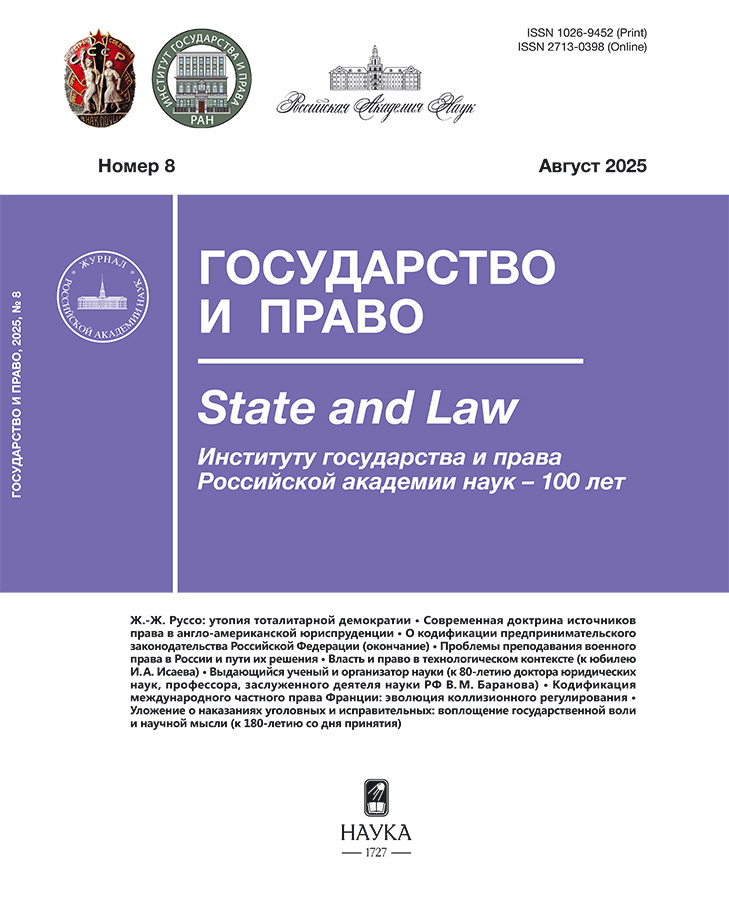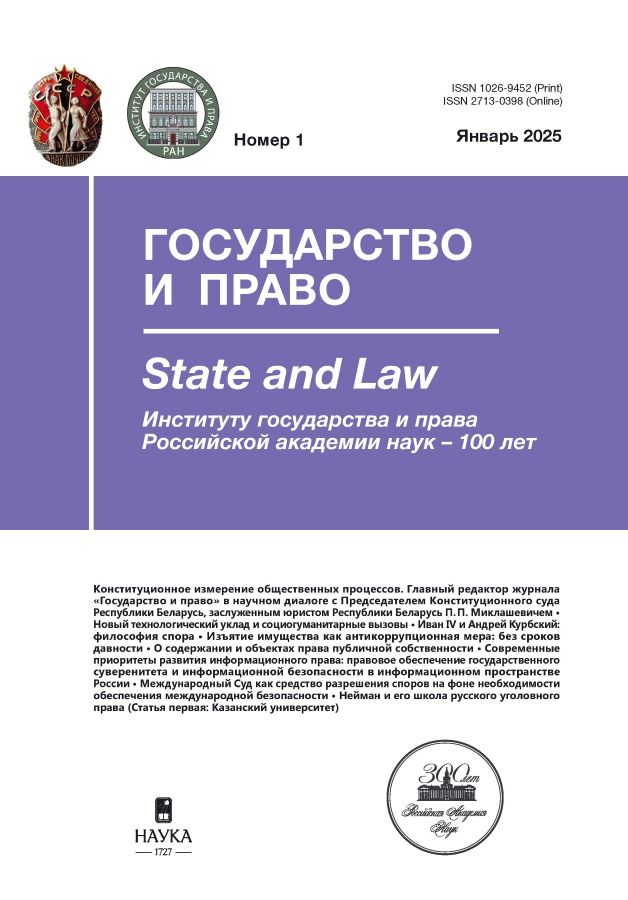St. Augustineʼs views on the relationship justice and law
- Authors: Khrameshin S.N.1
-
Affiliations:
- Slavic Greek Latin Academy
- Issue: No 1 (2025)
- Pages: 68-73
- Section: Legal, political, philosophical and religious thought
- URL: https://ruspoj.com/1026-9452/article/view/678451
- DOI: https://doi.org/10.31857/S1026945225010058
- ID: 678451
Cite item
Abstract
This article examines St. Augustine’s views on the relationship between justice and law, which represent a significant contribution to the history of the state and law, as well as to Christian theology and philosophy. Augustine argues that true justice comes from God and should be the basis of any legal and political order. Laws, he argues, have meaning only if they are based on divine justice; otherwise they lose their legitimacy and become arbitrary rules upheld by force. The article analyzes Augustine’s key ideas, such as the concept of ordered love (ordo amoris), theodicy, and the role of the state in ensuring justice. Specific examples from Augustine’s writings, such as “On the City of God” and “Confessions”, are cited, and the influence of his ideas on subsequent legal and philosophical thought, including the writings of Thomas Aquinas and the medieval concept of natural law, is discussed. Particular attention is paid to the relevance of Augustineʼs concepts in the contemporary context, where they continue to influence human rights theory and international law. A survey analysis of studies by modern Western and Russian researchers of St. Augustine’s work is conducted, outlining the development of his concept and the modern interpretation of his ideas relating to the problem of the relationship between justice and law in the state.
Full Text
About the authors
Sergey N. Khrameshin
Slavic Greek Latin Academy
Author for correspondence.
Email: rector@sgla.ru
ORCID iD: 0000-0002-1074-0649
Doctor of Theology, Doctor of Philosophy (PhD), Candidate of Philosophical Sciences (History of Philosophy), Associate Professor (Theoretical and Historical Legal Sciences), Honorary Worker of Education of the Russian Federation, Professor, Scientific Supervisor
Russian Federation, 20 Radio str., 105005 MoscowReferences
- Averintsev S. S. The evolution of philosophical thought // Culture of Byzantium IV – trans. VII century. M., 1984. Pp. 42–77 (in Russ.).
- St. Augustine. On the order // Augustine Aurelius. Creations. Vol. 1. On true religion / comp. and get ready. text by S. I. Eremeev. SPb.; Kiev, 1998. Pp. 114–183 (in Russ.).
- Evlampiev I. I. Metaphysical aspect of the concept of the Church in Catholicism, Protestantism and Orthodoxy // Verbum. 1999. No. 1. URL: https://cyberleninka.ru/article/n/metafizicheskiy-aspekt-ponyatiya-tserkvi-v-katolitsizme-protestantizme-i-pravoslavii (accessed: 29.01.2025) (in Russ.).
- Epifanova T. V., Bureev A. A. The divine law in the de civitate dei of Augustine the Blessed (354–430) // Central Russian Herald of Social Sciences. 2015. Vol. 10. No. 6. Pp. 231– 236. doi: 10.12737/16835 (in Russ.).
- Legoyda V. R. Religiosity in a non-religious era // Alpha and Omega. 2000. Vol. 2. No. 23. URL: https://www.pravmir.ru/religioznost-v-bezreligioznuyu-epohu (accessed: 29.01.2025) (in Russ.).
- Losev A. F. History of ancient aesthetics: in 8 vols. M., 2000. Vol. 3. High classics. P. 118 (in Russ.).
- Florovsky G. V. The Eastern Fathers of the IV century (from readings at the Orthodox Theological Institute in Paris). Paris, 1931. P. 240 (in Russ.).
- Coleman J. The Philosophy of Law in the Writings of Augustine // A Treatise of Legal Philosophy and General Jurisprudence. Vol. 6. A History of the Philosophy of Law from the Ancient Greeks to the Scholastics. 2015. Pp. 196–198.
- Crouse R. D. The Augustinian Background of St. Anselm’s Concept Justitia // Canadian Journal of Theology. 1958. Vol. 4. No. 2. Pp. 114–119.
- Dodaro R. Christ and the Just Society in the Thought of Augustine. Rome, 2008. Pp. 122–126.
- Elshtain J. B. Augustine and the Limits of Politics. Notre Dame, Indiana, 2018.
- O’Donovan O. The Desire of the Nations: Rediscovering the Roots of Political Theology. Cambridge, 2008.
- Smith J. K.A. Desiring the kingdom (cultural liturgies): Worship, worldview, and cultural formation. Grand Rapids, Michigan, 2009.
- VanDrunen D. Natural Law and the Two Kingdoms: A Study in the Development of Reformed Social Thought. Grand Rapids, 2010. Pp. 19, 20.
Supplementary files











